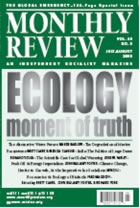By Ian Angus
August 24, 2008 -- Will shared resources always be misused and overused? Is community ownership of land, forests and fisheries a guaranteed road to ecological disaster? Is privatisation the only way to protect the environment and end Third World poverty? Most economists and development planners will answer “yes” — and for proof they will point to the most influential article ever written on those important questions.
Since its publication in Science in December 1968, “The Tragedy of the Commons” has been anthologised in at least 111 books, making it one of the most-reprinted articles ever to appear in any scientific journal. It is also one of the most quoted: a recent Google search found “about 302,000” results for the phrase “tragedy of the commons”.
For 40 years it has been, in the words of a World Bank discussion paper, “the dominant paradigm within which social scientists assess natural resource issues” (Bromley and Cernea 1989: 6). It has been used time and again to justify stealing indigenous peoples’ lands, privatising health care and other social services, giving corporations ``tradable permits'' to pollute the air and water, and much more.




